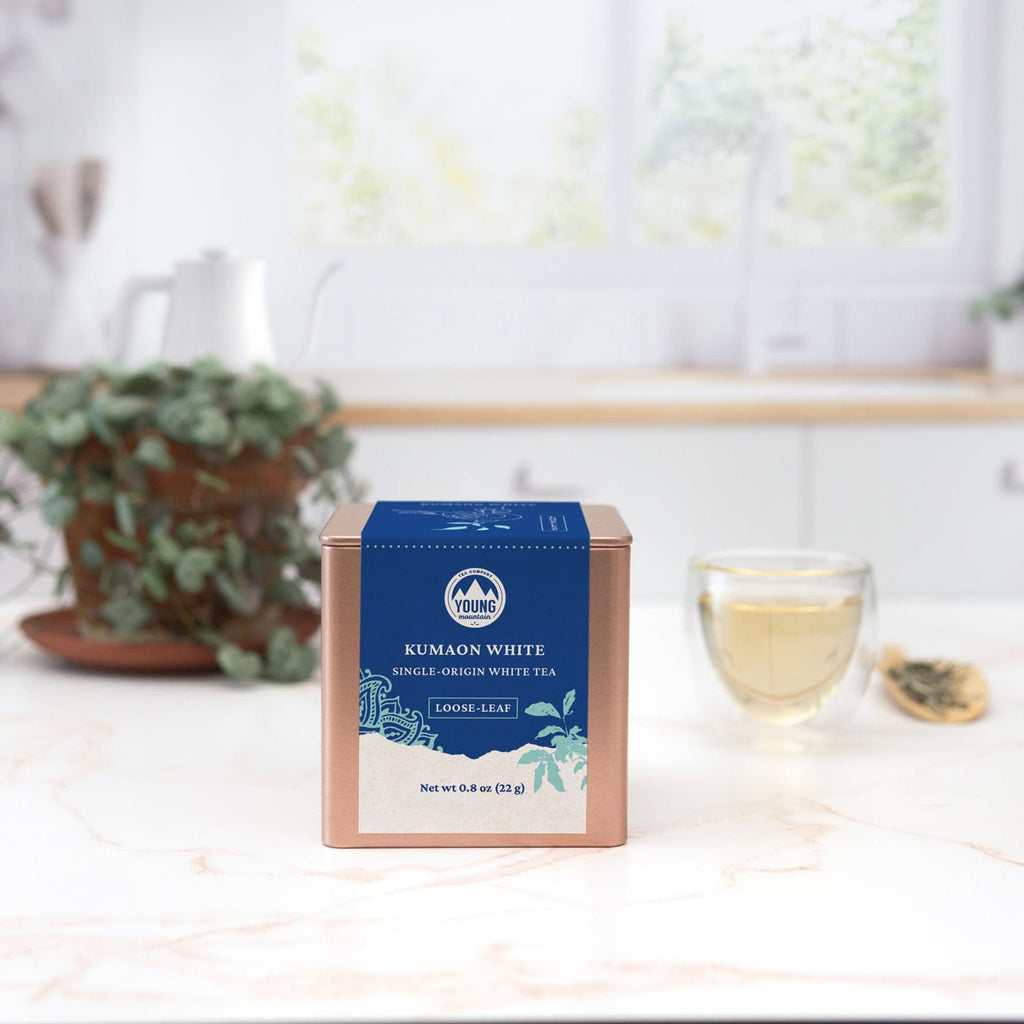
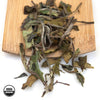
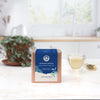
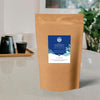
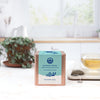

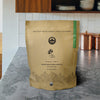
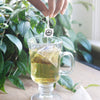
$14.99
PLEASE NOTE: Our tea bags our certified organic, and the current lot of the loose-leaf is 100% organically grown but not certified due to changes in USDA organic requirements, which forced Indian farmers to get re-certified. Thanks for understanding!
Taste: Peeled cucumber & honeydew melon
Origin: Kumaon, North Indian Himalayas
Tea Makers: Champawat Village
Infusion Suggestions:
Steep 1 2 Tbsp /2.5 g | 8 oz | 170° F | 3 min
Steep 2 8 oz | 175° F | 4 min
Certifications: USDA Organic
Contains Caffeine
Kumaon White: A fresh and bright organic white tea from one of India’s forgotten tea regions. This tea is harvested on small-scale farms in the early spring from bushes that are nearly 200 years old.
Tasting Notes: “What does white tea taste like?” is a question many people ask. While minimal processing makes most white teas delicate-bordering-on-flavorless, the Kumaon White has a full, juicy body and brightness that makes it shine. This Himalayan spring tea captures the clean and floral aromas of new growth. When steeped, the fully intact buds release notes of vegetal peeled cucumber alongside floral honeydew melon, with a lingering spicy-sweet cinnamon finish. Straddling what traditionally defines green and white teas, expect a floral smoothness with a fresh, clean, and bright finish. As the tea ages, it acquires more depth and smoothness, and the longer it ages, the better. So stock up to enjoy this tea for years to come! Lovers of White Peony (Bai Mudan) and Jasmine Green will likely enjoy this tea.
Production: The best white teas come in spring, which in Kumaon is typically late March or early April. Great care is taken to protect the leaf from damage as it is transported from field to factory where, unlike green and black teas, it is left intact to wither and dry with no rolling or heat applied. The unique taste of Kumaon White can, in part, be attributed to the age of the nearly 200-year-old bushes that are harvested for this tea. These bushes were planted by the British in the 1830s from seeds that were imported (or smuggled, depending on who you ask) from China. We’re particularly proud of this tea, because we had a hand in its creation: in 2015, we asked a local tea maker named Desmond Birkbeck if he could make a white tea for our customers. At the time, Kumaon farmers hadn’t heard of white tea. On our visit while standing around a cupping table in their factory, we shared a sample of white peony tea from China. Desmond, who grew up in a tea garden, crushed the tea in his hand, smelled it and said “If this is what you want, I can do it.” The rest is history!
Region: Nestled in the foothills of the mighty Himalayas, Kumaon lies 20 miles west of Nepal’s border and is one of the most remote tea regions in all of India. When the British introduced tea to India in the 1830s, they were enticed by the acidic and well-drained soils of Kumaon. The plant thrived on the mountainside slopes, but the region’s isolation made it difficult for the British to get the tea from the mountains to the port. In the 1920s, the British began to abandon or sell off the experimental Kumaon tea plots. This prompted a group of six families from Sri Lanka to move into the region and try to pick up where the British left off. All of those families left tea except one -- the Birkbecks -- who became the sole torchbearers of the Kumaon tea tradition. In the 1990s, the local government joined forces with the Birkbecks to help other local communities grow tea. This tea was all sent to the auction or sold locally until we entered the picture in 2015. Young Mountain Tea is proud to be the first US importer of Kumaon teas, and we are working with Birkbecks and other partners across the tea industry to help reintroduce Kumaon’s unique and exceptional teas. Read our blog about this region here.
Tea Makers: Desmond Birkbeck comes from the only family that continued to work in tea after the British abandoned Kumaon in the 1920s. Desmond grew up on his family’s remote tea garden, which is only accessible by a gravel road that twists through an oak forest with howler monkeys overhead. He fondly tells the story of the time he wrote a letter to the Tea Board of India when he was just 14 years old, requesting his family’s tea garden be granted the status that would allow it to sell in auctions. He left home for college and eventually received his master’s degree in biochemistry. After earning his degrees, he had a choice to either pursue a job in the US or return home to help his community through tea. He chose to return home, and today, he is a leading force behind organizing local tea farmers to grow and make quality tea.
Impact: In Kumaon, our relationship runs deepest. For more than a decade, we’ve worked side-by-side with Himalayan farmers to build a new model of tea, rooted in shared ownership, regenerative agriculture, and community leadership.
Together, Young Mountain Tea and local farmers co-own India’s first farmer-led specialty tea factory, launched in 2025. It’s the result of years of joint capacity building including training in organic cultivation, small-batch processing, and leadership development. Today, ~500 farmers in the Champawat region produce 30,000 lb of certified organic tea each year, and 90% of them are women earning their first-ever independent income through tea.
Farmers earn in two ways: first, by selling their harvest to the factory at 5x commodity rate; and second, by sharing in the factory’s future profits as co-owners. Alongside this economic transformation, we’re also restoring the land, running regenerative agriculture trials that compare biochar, home compost, and cow-dung fertilizers to revive once-abandoned hillsides with thriving organic tea bushes.
Our long-term goal is to develop the Kumaon Model as a blueprint for how tea can uplift Himalayan communities, beginning with 6,000 farmers across Kumaon and ultimately inspiring change throughout the global tea industry.
1% of all Young Mountain Tea sales directly support the factory’s launch and the farmers who will own it. Learn more.
Packaging: Our commitment to sustainability means we offer our teas in several types of packaging:
